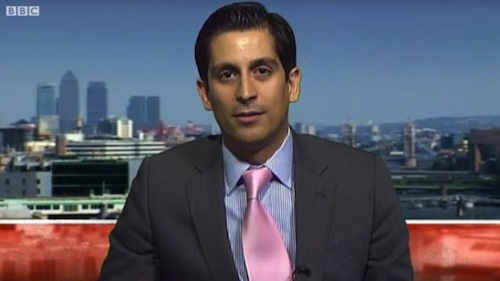 On Monday, a trader named Alessio Rastani told BBC interviewers that he was “dreaming of another recession” and that “governments don’t rule the world; Goldman Sachs rules the world.” It seemed like bad news. Rastani’s candor—some might call it glee—in describing how he profits from the kind of large-scale economic disaster in which we’re currently living also made it seem like a hoax. Several Twitter wags accused him of being a member of Yes Men, the group of agitprop performance artists who impersonate corporate spokespeople to draw attention to, well, the kind of thing Rastani talked about. But Yes Men has disclaimed him, and Rastani is an actual private day trader, as near as the BBC can tell. If he is a Yes Man, the organization is fielding much better actors, as this 2006 interview with a Dow Chemical impersonator suggests. That’s what a fake interview looks like. Rastani looks real, but what is he?
On Monday, a trader named Alessio Rastani told BBC interviewers that he was “dreaming of another recession” and that “governments don’t rule the world; Goldman Sachs rules the world.” It seemed like bad news. Rastani’s candor—some might call it glee—in describing how he profits from the kind of large-scale economic disaster in which we’re currently living also made it seem like a hoax. Several Twitter wags accused him of being a member of Yes Men, the group of agitprop performance artists who impersonate corporate spokespeople to draw attention to, well, the kind of thing Rastani talked about. But Yes Men has disclaimed him, and Rastani is an actual private day trader, as near as the BBC can tell. If he is a Yes Man, the organization is fielding much better actors, as this 2006 interview with a Dow Chemical impersonator suggests. That’s what a fake interview looks like. Rastani looks real, but what is he?
Category Archives: Contemporary Media
Rick Perry for President of exploding Superamerica
httpv://www.youtube.com/watch?v=8EL5Atp_vF0
First of all “Superamerica” is totally in the OS X spellcheck dictionary, which makes me think it’s existed all along. Wouldn’t you rather live there than in the peeling, dilapidated husk of America depicted in this Rick Perry advertisement? The Perry campaign released this spot—titled “Rick Perry: Proven Leadership”—on Tuesday, and it joins a long line of Republican ads that portray the United States as, well, Detroit. Even the parking meters have garbage bags over them in Wrecked Now America, a place where everyone voted for Barack Obama just before vanishing. The only human being that appears in the first 30 seconds of this video is the President, plus a couple of TV anchors shown on pictures of TVs. The rest of the country is empty, except for that sound which has become so commonplace now that we hardly notice it: air raid sirens.
The last we will say about Glenn Beck
We’ve had a good time with Glenn Beck the last couple of years, if by “good” you are willing to mean “sardonic.” In 2009, he appeared to be a person of baffling importance, and not just to us. He assembled a religious revival on the National Mall. He organized character assassinations of federal officials. And he convinced many old people to buy gold. Since he lost his Fox News show, however, Beck’s plummet from the national stage has been startling. He managed to step off the front rather than into the wings, but his whimpering from the orchestra pit is just as pitiful. So Combat! blog is going to leave Glenn Beck alone forever, just as soon as we address the incredibly stupid shit he said this morning.
Conor Friedersdorf on becoming a character in a conspiracy

Andrew Breitbart, whose picture is _much_ easier to find on the internet than Conor Friedersdorf's—I'm just saying.
Marshall McLuhan once defined “news” as events that we know about even though they don’t directly affect us. His construction highlights an important aspect of the form: because you learn about news from reports and not from observed phenomena, the credibility of the reporter becomes paramount. Basically, unreliable reporter is to news as schizo-affective disorder is to lived experience. It so happens that the growth of the internet combines vastly more news outlets with vastly reduced reliability, so that getting your news from the web is the equivalent of either having a crystal ball the lets you see into every corner of the world or of staring into your aquarium and believing it is a crystal ball that et cetera etc. You just don’t know. Thus is internet news particularly at the mercy of its reporters’ ethics, and by extension particularly vulnerable to insane, slanderous conspiracy theories. Just ask Atlantic reporter Conor Friedersdorf.
Tom Owad’s map of subversive books
Remember back when the United States was an ever-richening homeland departmentally securing itself against all threats, foreign and domestic, real and perceived? It was 2006. The Patriot Act had finally established as law the relation between patriotism and the executive branch, Crank had captured America’s hearts, and George W. Bush was calmly gathering library borrowing records. Had you forgotten that last part, as I sort of did? Yes, because the library is for bums and very old people—but theoretically I was against it, if only in preparation for being a very old bum. The US government should not subject its people to data-mining. That’s the term for describing patterns in very large amounts of data, a process presumably done by vast, semi-aware supercomputers in Virgina basements. Or, as Tom Owad demonstrated, by a dude with two Powerbooks and DSL.


